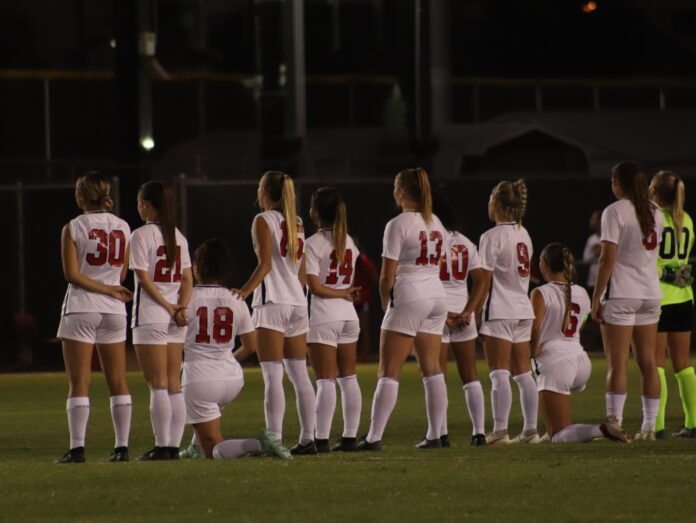
From the start of the 2021 season, the UNLV women’s soccer team begins each game with players voicing a stand for everyone in the audience to hear loud and clear. During the national anthem, a few Rebels kneel to show their respect to the troops, but still show their support for the fight for social injustice.
Five players wearing scarlet and gray take a knee prior to the anthem. They are willing to use the platform they have earned, even if only for a brief moment, for a cause greater to them than the scrutiny they may receive for their silent protest.
The protest of kneeling during the national anthem began in 2016 when then-San Francisco 49ers Colin Kaepernick began sitting on the bench as opposed to standing during the anthem.
The act had gone unnoticed for two weeks before he was asked about it by the media. Afterwards, he revealed he was doing so in protest of racial injustice and police brutality. Kaepernick switched from sitting to kneeling during the anthem as a sign of respect for the troops.
Since then, athletes in professional and amateur sports have adopted the silent protest to champion a cause they believe to be significant or lacking awareness. However, many people feel that kneeling for the anthem is disrespectful toward those in service to our country.
Jules Dominguez, redshirt junior defender and captain of the team, is one of the five Rebels who knelt during the national anthem with a unique perspective on the matter. She doesn’t believe her actions are disrespectful toward the military even with Arizona native having reason to honor our service members.
“I was having a conversation with my mom about that recently,” Dominguez said. “We’re going to play at Air Force [next week]. My grandpa was in the Air Force. I don’t think me kneeling is anything against the troops. I respect them. I think at the Air Force game, I won’t kneel because those people fight for our country, and they aren’t the people that need to hear the message.”
The message Dominguez is referring to is one on the minds of many individuals: the inequalities that exist in the treatment of non-privileged people in our country. She’s not acting out in disrespect toward people like her grandfather; she’s fighting for people who can’t fight for themselves.
“It’s nothing political on my side,” Dominguez added. “It’s just to show that not everybody is treated equally. With the things that have gone on in the past couple of years, and all the history, it needs to be heard by everybody.”
The sentiment is supported by their head coach Jenny Ruiz-Williams. Although the team did not discuss with her their plans to kneel prior to doing so, Ruiz-Williams’s unwavering support for her players’ freedom to express themselves is undeniable.
“I support each one of them and where they are,” Ruiz-Williams said. “However, I can support or lift them up. That’s my job to lift them up, or sometimes, to push them. At this moment, I’m lifting them.”
We demand quite a bit from our athletes, skill, grace, poise, intuitiveness, aggressiveness and victory. We expect physical and mental perfection, all in the name of our pride and entertainment.
However, when they elect to use the momentum they’ve earned to communicate an issue that plagues them as a person, we refuse to hear it.
